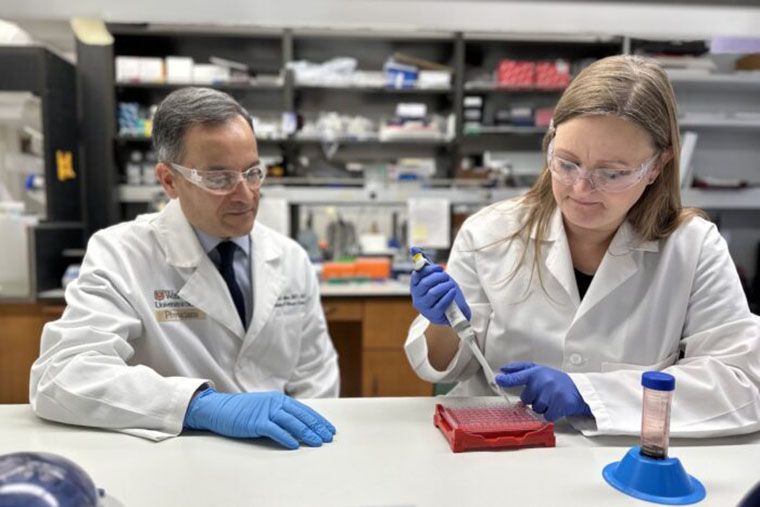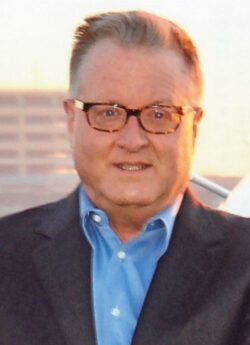
Washington University School of Medicine in St. Louis has received a $15 million pledge from philanthropist Jeffrey T. Fort, aimed at accelerating research and developing new treatments for diseases that cause vision loss. The gift will support innovative research led by retinal surgeon and scientist Rajendra S. Apte, MD, PhD, of the John F. Hardesty, MD, Department of Ophthalmology & Visual Sciences.
Deterioration of the parts of the eye essential for clear vision - such as the macula and retina - can lead to vision impairment and, eventually, blindness. The gift will fund research to understand how inflammation and neurodegeneration can cause diverse eye diseases that affect millions of people worldwide. Such research is essential to developing novel therapies to prevent or treat vision loss.

"We are deeply grateful to Jeffrey Fort for his continuous support of Washington University, the research efforts of our faculty, and the patients who benefit from his kindness," said Chancellor Andrew D. Martin. "His generous gift will lead to discoveries with great potential to be translated into therapies that can improve the lives of the many people suffering from illnesses that cause vision loss."
David H. Perlmutter, MD, executive vice chancellor for medical affairs, the George and Carol Bauer Dean of the School of Medicine, and the Spencer T. and Ann W. Olin Distinguished Professor, reiterated appreciation for Fort's generosity.
"This generous gift from Jeffrey Fort recognizes the exceptional caliber of our physician-scientists and their dedicated staff within the Department of Ophthalmology & Visual Sciences," Perlmutter said. "Together, they are delivering tremendous medical care and working to make significant advancements in the field of visual science. We are deeply grateful to Mr. Fort for his desire to help us with these extremely important endeavors."
Under the care of Washington University physicians for nearly four decades, Fort intimately understands the impact of ocular disease. Ophthalmologists at the School of Medicine diagnosed and treated his eye conditions.
"This gift is about the future, a moonshot that will allow us to take a giant leap forward," said Apte, who is the Paul A. Cibis Distinguished Professor and vice chair for innovation and translation and has known Fort and his family for a decade. "Jeffrey Fort has a big personality and an even bigger vision for the future. He realizes the problems people face and is inspired by the innovative ideas that one day can lead to therapies to help them.
"As a St. Louis native, he is proud of the impact that Washington University is making in the community. His generosity is a testament to his dedication to the betterment of the community."
Fort established the Jeffrey T. Fort Innovation Fund in 2015 within the Department of Ophthalmology & Visual Sciences, providing a $1 million gift to help fund researchers exploring the root causes of visual diseases such as age-related macular degeneration, diabetic retinopathy and other blinding conditions. Five years later, he pledged another $1 million to the Jeffrey T. Fort Innovation Fund.
Fort's support already has contributed to Apte's understanding of how metabolism affects neuronal function in the retina. The resources have positioned his group to test molecular targets in human clinical trials for aging and ocular diseases, including retinal and macular degeneration. Further, the support has helped shine a light on the role of the immune system in the early stages of diabetic retinopathy, a condition in which high blood glucose damages blood vessels in the retina and can lead to blindness. The new $15 million pledge will fund clinical trials, among other research, that aim to identify targeted therapies designed for individual patients based on their specific conditions.
"These gifts signify a friendship," said Fort, who made his first gift to the School of Medicine in 2011. "I have great respect for Washington University faculty and their contributions to research and medicine."
Ideas that were once largely unfeasible due to the research resources required are now within reach, Apte said. Fort's commitment to visual sciences has enabled the physician-scientist to think bigger. For Apte, that is a welcomed challenge. He strives for precision medicine, tailoring health care and treatments to individual needs. Moving from bedside to the bench, identified targets then can be studied in animal models and cell-based systems before moving therapeutics to clinical trials.
"This generous investment to accelerate the retinal disease research led by Raj Apte is a testament to the strength of our faculty, the innovative science and leading-edge treatment in the John F. Hardesty, MD, Department of Ophthalmology & Visual Sciences," said Todd P. Margolis, MD, PhD, the Alan A. and Edith L. Wolff Distinguished Professor and head of the ophthalmology department. "We are committed to bridging science and clinical care to improve the lives of patients. This gift helps us lead the way."
Fort is an award-winning photojournalist. Now retired, he was co-owner and co-founder of Motive Creative, a digital production facility that specializes in theatrical trailers and media campaigns, in Hollywood, Calif. He also served as principal of Jeffrey T. Fort Investigations, which specializes in forensic work, witness interviews, and expert-witness support.
In addition to his gifts for the Department of Ophthalmology & Visual Sciences, Fort provided $5 million in 2019 for research in the Department of Neurosurgery and to establish the Margery Campbell Fort Professorship in Neurological Surgery, named in memory of his mother.
Coincidentally, Fort's latest gift for the ophthalmology department was finalized Oct. 6, which would have been his mother's 96th birthday. "Our mother was such a charitable and giving person," said Fort's sister, Liz Dorr, who helps coordinate his philanthropy. "She would have been so proud of Jeff's commitment to furthering medical research."
About Washington University School of Medicine
WashU Medicine is a global leader in academic medicine, including biomedical research, patient care and educational programs with 2,800 faculty. Its National Institutes of Health (NIH) research funding portfolio is the third largest among U.S. medical schools, has grown 52% in the last six years, and, together with institutional investment, WashU Medicine commits well over $1 billion annually to basic and clinical research innovation and training. Its faculty practice is consistently within the top five in the country, with more than 1,800 faculty physicians practicing at 65 locations and who are also the medical staffs of Barnes-Jewish and St. Louis Children's hospitals of BJC HealthCare. WashU Medicine has a storied history in MD/PhD training, recently dedicated $100 million to scholarships and curriculum renewal for its medical students, and is home to top-notch training programs in every medical subspecialty as well as physical therapy, occupational therapy, and audiology and communications sciences.
Originally published on the School of Medicine website






